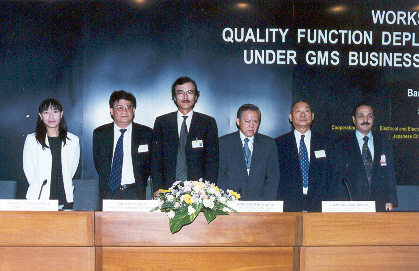
Photo shows from left: Dr. Anulark Techanitisawad, GMSARN Secretary and Institute's Secretary of AIT;
Prof. Mario T. Tabucanon, GMSARN Director and AIT Provost; Mr. Takashi Saito, Minister, Embassy of Japan;
Dr. Nibhon Debavalya, Director of International Trade and Industry Division, ESCAP; Mr. Sompong Nakornsri,
Chairman of the Electrical and Electronics Institute of Thailand; Dr. B. P. Dhungana, Chief of Industry Section,
International Trade and Industry Division, ESCAP.
Help to SMEs: GMSARN co-organizes QUALITY FUNCTION DEPLOYMENT workshop
The Greater Mekong Subregion Academic and Research Network (GMSARN), the United Nations Economic and Social Commission for Asia and the Pacific (UN ESCAP) and the GMS Business Forum, have co-organized the workshop 'QUALITY FUNCTION DEPLOYMENT.' The cooperating agencies are the Electrical and Electronics Institute of Thailand and the Japanese Chamber of Commerce in Bangkok. Funding was provided by the Government of Japan. The workshop opened on Tuesday, 5 March at the United Nations Conference Centre in Bangkok and will be held until 13 March.
Mr. Takashi Saito, Minister, Embassy of Japan, addressed the opening ceremony together with Prof. Mario Tabucanon, AIT Provost and GMSARN Director;
Dr. Nibhon Debavalya, Director, International Trade and Industry Division, ESCAP; Dr. B. P. Dhungana, Chief, Industry Section, International Trade and Industry Section, ESCAP and Mr. Sompong Nakornsri, Chairman of the Electrical and Electronics Institute of Thailand.
Participants include representatives from GMS institutions and businesses, including lecturers of GMSARN's member universities. During the workshop, they will examine in depth the importance of Quality Function Deployment (QFD) in translating customer requirements into functional and quality characteristics and will review a wide range of technology applications suitable to the production of products and/or services desired by the market.
The workshop will be of particular benefit to small and medium enterprises (SMEs) in the GMS countries. Specifically, SMEs in the electric and electronics industry will be targeted, owing - in no small measure - to their rapid development and significant contribution to the region's prosperity. Because they are vital to the sustainable development of the region, SMEs must be assisted in developing and designing their respective products and services, taking into account the customs, cultures values, traditions, and life styles of their customers and client groups.
